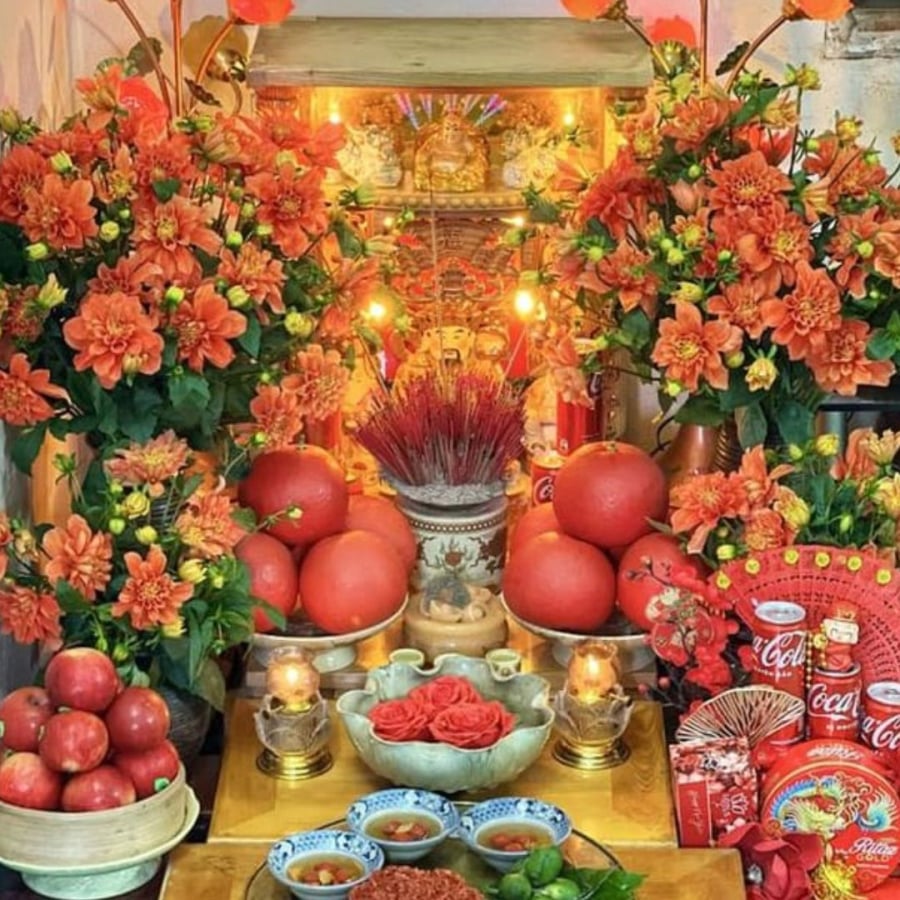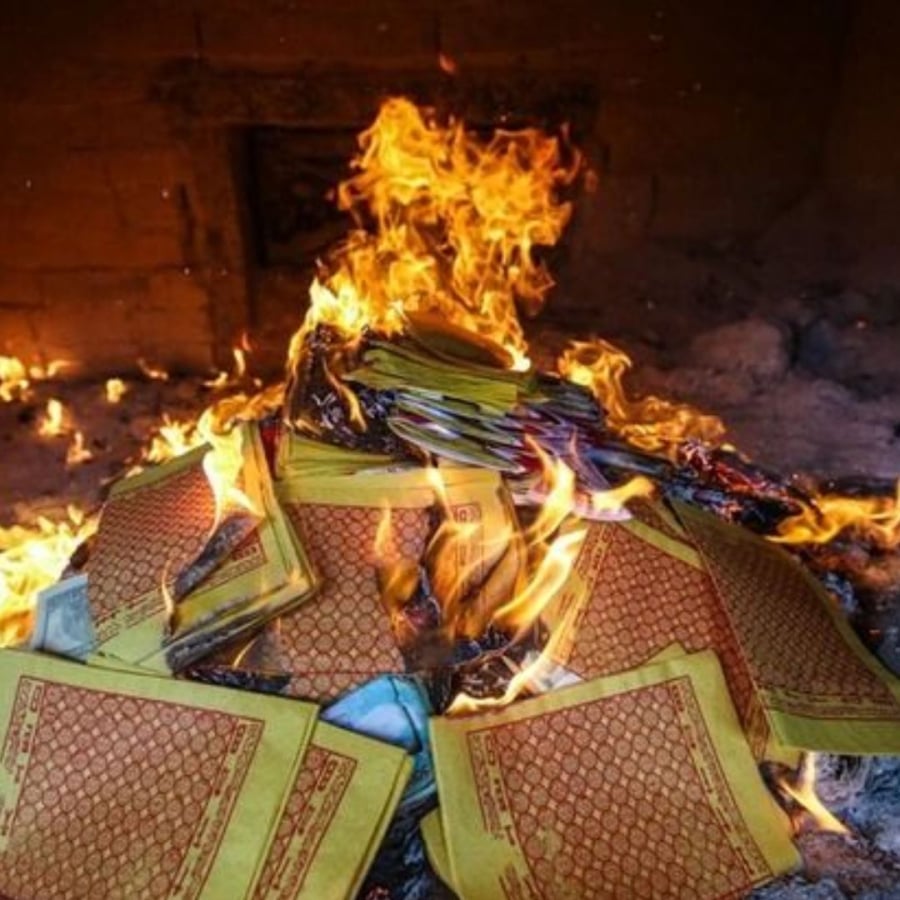The ritual of burning incense on the full moon day is an important spiritual practice in the lives of Vietnamese people, showing respect for ancestors and seeking blessings and peace. However, many people focus only on the proper way of burning incense and forget an important aspect: after the ceremony, the offerings must be taken down promptly. Leaving certain items on the altar for too long can not only result in lost blessings but also negatively impact the family’s feng shui.
Here are 5 things that must be removed from the altar after the ceremony to avoid creating negative energy and depleting good fortune:
1. Offered Flowers – Never Let Them Wilt and Wither
Flowers are a familiar offering on the altar, symbolizing purity and sincerity. Common choices include yellow chrysanthemums, lotuses, lilies, and roses – selected for their gentle fragrance and vibrant colors.

However, if the flowers are not removed after the ceremony and are left to wilt, wither, or develop an unpleasant odor, they inadvertently attract negative energy and taint the sacred space. In feng shui, withered flowers represent decline, loss, and negative influences on the wealth and fortune of the homeowners.
Note: It is advisable to remove the flowers on the same day or immediately after the week of incense burning. Avoid waiting until the flowers are completely wilted before taking action, as this may already impact the altar’s purity.
2. Fruits – Remove While Still Fresh, Don’t Wait Until They Spoil
The platter of five types of fruits or individual fruits offered during ceremonies is carefully selected to symbolize wishes for wealth and peace. However, due to the warm and enclosed nature of the altar area, fruits can quickly overripe, ferment, or mold if left for too long.
Spoiled fruits are considered a symbol of diminished blessings. Leaving them on the altar creates negative energy, hindering prosperity and smooth sailing. Therefore, it is recommended to remove the fruits after 1-2 days of offering and either consume them or share the blessings with family members, avoiding keeping them for more than 5 days even if they appear “okay.”
3. Joss Paper – Burn It on the Same Day
On occasions like full moon or new moon ceremonies, or during the year-end ceremony, joss paper is offered, and many tend to forget or leave it on the altar for several days after incense burning.
This practice is not advisable as the joss paper can accumulate dust and become moldy, detracting from the solemnity of the worship space. Additionally, joss paper is meant for the deceased, and not burning it promptly can interrupt the “path of blessings,” resulting in unanswered prayers.
Best practice: It is best to burn the joss paper immediately after the incense-burning session (around 30-60 minutes after lighting) or, at the latest, on the same day. Avoid leaving it until the next evening or accumulating it for multiple ceremonies before burning.

4. Food and Sweets – Avoid Leaving Them Overnight
During death anniversaries, full moon ceremonies, or festive occasions, cooked food or sweets are often placed on the altar. However, leaving cooked dishes like rice, soup, sticky rice, or porridge for too long, especially overnight, can lead to spoilage, bacterial growth, and unpleasant odors, thus creating impure energy.
From a feng shui perspective, spoiled food signifies decay and stagnation, weakening the positive energy flow within the home. It can also negatively affect the homeowners’ health, finances, or luck.
Recommendation: After the incense has burned out (around 1-2 hours), it is advisable to remove the food and share the blessings with family members. For sweets with longer shelf lives, they can be kept for an additional 1-2 days but should not exceed 3 days to avoid dust and dirt.
5. Offering Water – Change It Daily to Avoid Stagnation
The offering of water – typically three cups of filtered or tea – is a small but vital detail in maintaining the altar’s purity. Water, when left unchanged, can turn cloudy, develop sediment, attract dust, and become a breeding ground for bacteria.
This also symbolizes the accumulation of negative energy, diminishing the altar’s sanctity and impacting the spiritual connection with ancestors.
Best practice: Refresh the offering water daily, cleaning the cups and using fresh, pure water (avoid using stale or overnight water).
Taking down the offerings after the ceremony is a crucial yet often overlooked step. Regardless of your sincerity, leaving offerings to wilt, spoil, or mold can not only diminish the spiritual significance but also bring about negative consequences for the family’s feng shui and fortune.
Reference for contemplation
Is It Beneficial to Plant Magnolia Trees in Front of Your House? 3 Lucky Spots for Planting These Money-Attracting Trees.
The Golden Rain Tree, also known as the Money Tree, is a popular choice for Vietnamese homeowners and businesses alike, especially when it comes to decorating entrances and foyers. With its lush green appearance, this tree is a sight to behold, but it offers more than just aesthetic appeal. The Golden Rain Tree is a symbol of prosperity, health, and good fortune, making it the perfect addition to any space seeking to attract wealth and positive energy.
The Magic Trio for Prosperity: Unveiling the Secrets to Abundance by Rethinking These Three Household Items
The ancient practice of Feng Shui holds a wealth of wisdom for modern-day homeowners. Superstitions surrounding the placement of objects on top of refrigerators are among its intriguing beliefs. A skilled practitioner of Feng Shui would advise against placing these three items atop your fridge, as doing so is thought to invite misfortune and negative energy into your home.





































